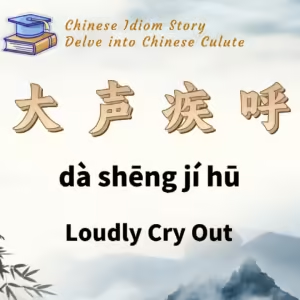
Chinese Idiom: 啼笑皆非 (Ti Xiao Jie Fei)
English Translation: Crying and laughing both are inappropriate
pīn yīn: tí xiào jiē fēi
Idiom Meaning: This phrase describes a situation that is so awkward or absurd that one cannot decide whether to laugh or cry.
Historical Source: This idiom originates from the poem “Emotions” (情感) by the Tang poet Mengchai.
Idiom Story:
During the reign of Emperor Wen of the Sui Dynasty, when he waged war against the Southern Chen Dynasty, the princess of Chen, Princess Lechang, and her husband, Xu Deyan, sensed the impending doom of their kingdom. Foreseeing their potential separation after the fall of Chen, Xu Deyan broke a bronze mirror in half and kept one piece for himself while giving the other half to his wife. They made a pact: if they were to be separated, on the fifteenth day of the first month the following year, Princess Lechang would go to the capital city’s marketplace to sell her half of the mirror, and he would search for her there.
After the Chen Dynasty fell, they were indeed separated. Princess Lechang was taken by Yang Su, a powerful official of the Sui Dynasty, and won his affection. Meanwhile, Xu Deyan faced hardship and eventually made his way to the capital, Chang’an. Remembering their pact, he went to the marketplace, where he saw a servant selling a half mirror that matched his own. Xu Deyan then composed a poem titled Poem of the Broken Mirror:
The mirror leaves with the person; the mirror returns, but the person does not.
No more does Chang’e’s shadow exist; only the bright moonlight remains.
Here, “Chang’e” refers to the moon goddess, symbolizing Princess Lechang. The poem expresses his sorrow upon seeing the half mirror, which reminded him of their lost happiness. He lamented that although the mirror had returned, his beloved wife was still missing, leaving him feeling desolate.
The servant who sold the mirror returned it to Princess Lechang. Upon seeing Xu Deyan’s poem inscribed on the mirror, she was overwhelmed with grief and could not eat. Yang Su learned of the situation and invited Xu Deyan to join him and the princess for a drink, intending to reunite them. During the gathering, Yang Su asked Princess Lechang to compose a poem. In this delicate moment, she was in a challenging position, facing the powerful Yang Su and the memory of her husband. If her poetry was even slightly off, not only would she lose the chance to reunite with Xu Deyan, but she could also endanger her own life.
After a moment of contemplation, Princess Lechang recited:
Today brings another move; the new husband faces the old one.
Neither laughter nor tears dare show; one learns how difficult it is to be human.
Here, “new husband” refers to Yang Su, and “old one” refers to Xu Deyan. The essence of the poem reflects her deep emotions about the complexities of her situation, caught between her new life and her past love. Yang Su, touched by her words, permitted the reunion of Princess Lechang and Xu Deyan, allowing her to return to the South.
More than two hundred years later, the renowned Tang poet Li Shangyin wrote a five-character poem titled A Mockery of Princess Xu, humorously expressing sympathy for Princess Lechang’s plight:
Neither laughter nor tears dare show;
I almost want to swallow my voice.
Quickly send away the qin’s lament,
All from the bright half mirror.
One should guard against laughter and tears,
Subtle emotions peeking through.
In this poem, Li Shangyin suggests that while Princess Lechang may appear indifferent, her true feelings for her first husband and her fading affection for her new husband are evident. He warned her to conceal her emotions to avoid any trouble.






